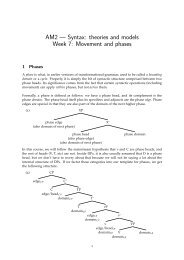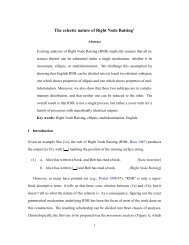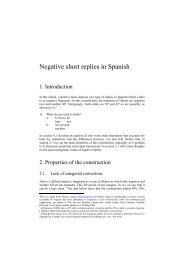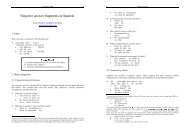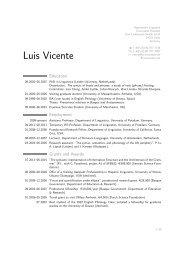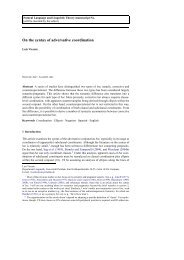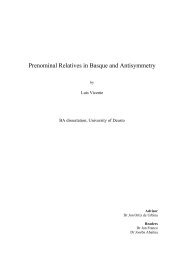Verb fronting in Mandarin Chinese - Luis Vicente
Verb fronting in Mandarin Chinese - Luis Vicente
Verb fronting in Mandarin Chinese - Luis Vicente
Create successful ePaper yourself
Turn your PDF publications into a flip-book with our unique Google optimized e-Paper software.
Cheng & <strong>Vicente</strong><br />
<strong>Verb</strong> <strong>front<strong>in</strong>g</strong> <strong>in</strong> Mandar<strong>in</strong><br />
UCSC L<strong>in</strong>guistics Colloquium<br />
October 31, 2008<br />
3.3 Interim conclusion<br />
<strong>Verb</strong>al lian...dou requires:<br />
• A-bar movement of a verbal constituent, with an obligatory presence of sentential negation.<br />
• Spell out of two l<strong>in</strong>ks of this A-bar cha<strong>in</strong> (to be discussed <strong>in</strong> section 5).<br />
4 The analysis of double pronunciation<br />
Standard view on double pronunciation of cha<strong>in</strong> l<strong>in</strong>ks: economy pr<strong>in</strong>ciples require PF to spell out only<br />
one l<strong>in</strong>k of a movement cha<strong>in</strong>, as that is enough to recover the semantics of the moved constituent.<br />
However, certa<strong>in</strong> morphological factors can override economy pr<strong>in</strong>ciples and force pronunciation of a<br />
second l<strong>in</strong>k.<br />
Factors that override economy pr<strong>in</strong>ciples:<br />
• Morphological repair: double pronunciation is necessary because otherwise we’d create a<br />
morphologically deviant structure (typically, one <strong>in</strong> which affixes are left without a stem).<br />
(38) German split topicalization<br />
a. Sie kennt [ke<strong>in</strong>en alten Professor]<br />
she knows no old professor<br />
[where ke<strong>in</strong>en = neg + ∃]<br />
b. * [E<strong>in</strong>en<br />
a<br />
c. [E<strong>in</strong>en<br />
a<br />
alten<br />
old<br />
alten<br />
old<br />
(39) Hungarian verb doubl<strong>in</strong>g<br />
Professor]<br />
professor<br />
Professor]<br />
professor<br />
kennt sie [k- ]<br />
knows she no<br />
a. Agy olvasta a könyvet<br />
Agy read.past.3sg the book.acc<br />
b. Olvasni,<br />
read.<strong>in</strong>f<br />
c. * Olvas(ni),<br />
read.<strong>in</strong>f<br />
kennt sie [ke<strong>in</strong>en]<br />
knows she no<br />
olvasta Agy a könyvet<br />
read.past.3sg Agy the book<br />
-ta Agy a könyvet<br />
past.3sg Agy the book<br />
This is clearly not go<strong>in</strong>g to work for Mandar<strong>in</strong>, given that Mandar<strong>in</strong> verbs don’t have any <strong>in</strong>flectional<br />
morphology that can be stranded.<br />
• Morphological fusion: double pronunciation happens because one of the copies fuses with<br />
another element, and therefore becomes <strong>in</strong>visible for the l<strong>in</strong>earization algorithm.<br />
(40) German wh- doubl<strong>in</strong>g<br />
a. Wen glaubt Hans wen Jakob gesehen hat?<br />
who.acc th<strong>in</strong>ks Hans who.acc Jakob seen has<br />
“Who does Hans th<strong>in</strong>k that Jakob has seen?”<br />
9 of 13



